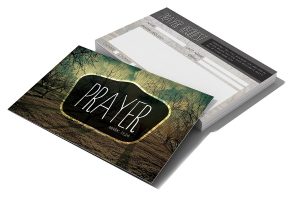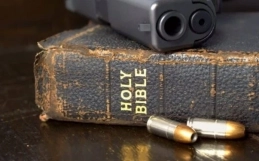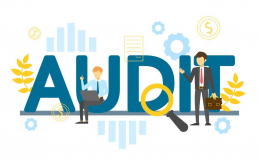Have you ever wondered about the legal implications of prayer cards that churches use in their weekly services? Many churches offer these cards as a means for members to let the church know their prayer requests. If you haven’t wondered about this, you’re likely in the majority. However, prayer cards can open the church to liability exposure if not handled carefully.
Consider the following scenario. Susie attends a Sunday Service and fills out a prayer card that she is instructed to drop in the offering basket. The prayer card makes its way to the prayer team and pastor. It says, “Please pray for my sister because her husband hit her again and I’m worried he may take it out on the children next.” Susie’s sister is a member at the church and her children are part of the children’s program. The pastor knows Susie’s sister and is concerned for the safety of the children. How should the church respond in this situation?
We recommend that all churches that use prayer cards take several cautionary steps: The top priority is to determine whether those who learn of the information in the prayer card are required by law to report information disclosing child abuse on the prayer card to the state.
California’s Penal Code has an extensive list of those who are considered mandated reporters of suspected child abuse. Clergy members, which are defined in the Code as a “priest, minister, rabbi, religious practitioner, or similar functionary of a church, temple, or recognized denomination or organization,” fall within the category of mandated reporters. In addition, “any custodian of records of a clergy member” are mandated reporters. This means that church secretaries and other lay people could be considered mandated reporters if their job—or even voluntary function–is to maintain records for clergy. As a result, churches must carefully determine if anyone else who sees prayer cards is a mandated reporter when the cards disclose child abuse. According to the California Penal Code, “A mandated reporter shall make a report to an agency whenever the mandated reporter, in his or her professional capacity or within the scope of his or her employment, has knowledge of or observes a child whom the mandated reporter knows or reasonably suspects has been the victim of child abuse or neglect.”
An important second step is to determine whether the mandated reporter is subject to an exception that either excuses, or even mandates that no report to the government be given. Clergy are subject to an exception for “penitential communications,” which are defined as “a communication, intended to be in confidence, including, but not limited to, a sacramental confession, made to a clergy member who, in the course of the discipline or practice of his or her church, denomination, or organization, is authorized or accustomed to hear those communications, and under the discipline, tenets, customs, or practices of his or her church, denomination, or organization, has a duty to keep those communications secret.”
This exception is a narrow one. The Penal Code that the exception does not limit a clergy member’s duty to report known or suspected child abuse or neglect when the clergy member is acting in some other capacity that would otherwise make the clergy member a mandated reporter.” Therefore, a pastor is mandated reporter unless the prayer card is considered a penitential communication.
Our courts have not addressed whether a prayer card could ever be considered a penitential communication. Churches can take steps to bring some clarity to this issue. And initial step is to include a box on the prayer card that says “CONFIDENTIAL—For the pastoral team only”. The goal is to indicate that the prayer request is intended to be communicated only to someone in a pastoral role. This could be helpful evidence that the communication was intended to be penitential and the pastor might not be a mandated reporter in that situation.
If the prayer card does not indicate that the prayer request is meant to be for the pastors only then the pastor cannot invoke the exception and should make an immediate report. The Code requires reports to be made “as soon as is practicably possible” and a written report is required within 36 hours. One report is sufficient if there are multiple pastors who saw the content of the prayer card. That is, if a prayer card is shared among several clergy members and the penitential communication exception does not apply, each clergy members can rely on the report of one person, provided they know that the report was made. The only practical way to be confident of compliance is for the first clergy member to see the prayer card to include a note indicating that a report has been made, and circulate that with the card. Prayer cards should not be routinely circulated until after the first clergy recipient has read them. And, the first reader should always be a member of the clergy, not a lay custodian of records.
A further question is whether anyone else who saw the prayer card is a mandated reporter if the communication was not marked confidential. The answer depends on the role of those who may have seen the prayer card. If someone is not a pastor by title but they are employed by the church in a role that is ministerial in nature, they could be viewed as a mandated reporter and must make an immediate report. Since this is a fact-specific matter, it may be best to have an attorney review the matter prior to the leadership choosing to make the report.
Everyone wants to keep children safe. Even if the prayer card is confidential and the reader is exempt from making a report, churches should always consider the steps they can take to ensure the safety of children who are at risk of harm. We recommend that all churches have a comprehensive plan in place to follow up with all reports of possible child abuse and neglect. The Church Law Center of California offers a variety of services to help churches support those within their care while also staying within the bounds of the law.






